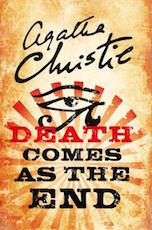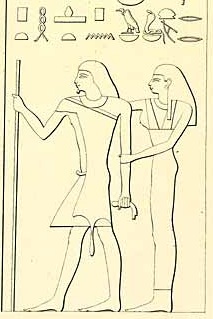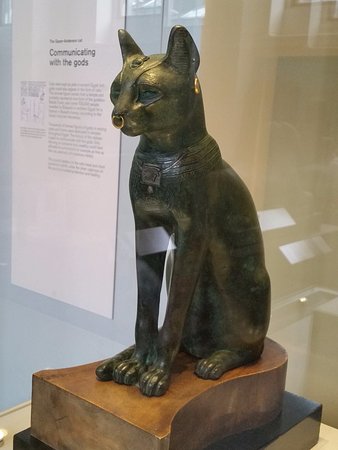
Poirot Score: 51
Death Comes as the End
☆☆
Explanation of the Poirot Score
Death Comes as the End is another ground braking detective novel, an historical one, set in Thebes in 2000BC. Christie wrote this long before the current fashion for detective mediaeval Shrewsbury Abbey monks, or murders set in Restoration London or Victorian Edinburgh. It deserves marks for this. However, by setting the plot in ancient Egypt, Christie was so careful to get all the facts and interesting customs correct, that they somewhat detract from the plot and possible clues. It is still an interesting read, and also sheds light on Christie’s deep love of Shakespeare.
Click here for Review [plot spoilers ahead]
Trivia
Dedication to Professor Stephen Glanville

‘for all the interesting literature you have lent me.’
Very few people have TWO dedications from Christie [see Five little Pigs trivia]. Stephen Glanville was 44 yrs old in 1944, and Agatha Christie was 54 yrs old. He was an English historian and Egyptologist: a close friend and colleague of Christie’s second husband, Max Mallowan since 1925. Glanville seems to have been very supportive to Christie when Max was away in N. Africa, during these Second World War Years. Glanville encouraged her to set a book in ancient Egypt: Death Comes as the End, and advised her with the play, Akhnaton.
It is not clear just how close Stephen Glanville and Agatha Christie were at this time. Glanville was working in London at the Air Ministry during the War, and Christie was living by herself in a flat in Lawn Road, London. In Laura Thompson’s biography, it is said ‘Stephen fell in love with every woman he met.’ Agatha Christie wrote to Max about Stephen ‘Of course, he isn’t really adult like you’. Glanville was married with two daughters, but he’d sent his own family to the safety of Canada, to get them out of the theatre of the European War. Glanville and Christie were both alone in London. She went to a lecture of Stephen’s in November 1942 and then wrote to Max ‘’what an attractive voice he has’. She invited him down to Greenway, her country house in Devon. By 1943, Stephen had persuaded her to write a novel set in Ancient Egypt. When it was finished, Max wrote to both of them with his concerns. The reply from Glanville was rather frosty
‘I’m not clear whether you are afraid that the book will damage her reputation as a detective story writer, or whether you think archaeology should not demean itself by masquerading in a novel.’
Christie chose Stephen Glanville to escort her, and her adult daughter, Rosalind, to the West End Premier of ‘And then there were None’ as the play, she had adapted from her book.
He wrote a thank you note:
‘Agatha darling – Last night was really something to remember… The whole thing was FUN-…But best of all was the diverse experience of Agatha: Agatha really nervous [as she must be until the show is over] – not just shy – even in the midst of close friends: Agatha in the moment of triumph, quite radiant, but still asking only for her friends, and incredibly unegotistical; at last, and perhaps most precious, Agatha still quietly excited, but beautifully poised and content………’
Clearly he had fallen under her spell. Glanville apparently confided to a friend he was in love with ‘Agatha’. Christie enjoyed his company, but her letters to Max are full of longing for her husband’s return from the War, or her attempting to go out to Egypt to be with Max. Later in 1944 Glanville moved into the block of Lawn Road flats where Christie also lived. Glanville acquired a mistress, Margaret, and he decided to leave his wife and children. This made Agatha Christie very distressed, with echoes of Archie Christie walking out on her and Rosalind. In a letter to Max she wrote ‘Stephen is a most lovable person – so very sensitive and vulnerable in many ways – and yet with an odd streak of cruelty…Oh darling – life is cruel – …separations are the most cruel things of all, seeing other people’s lives break up frightens me. Not us – not us.’
The next book Agatha Christie wrote was The Hollow, where the character John Christow is involved with three women at once. People have speculated that John Christow’s vitality, magnetism and intellect are based on Glanville. The Mallowans remained friends with Glanville until his death.
Unlike all her other books, which are set contemporaneously, Christie exhibits her knowledge of Ancient Egypt throughout this book. It was a huge challenge to bring off this idea.
The Book of Ptah-Hotep: the oldest self-help book in the World
The Instruction of Ptah-Hotep contains distilled wisdom, containing thoughts on how to be well, happy and live justly: from about 3500 BC.
Ptah-Hotep was the Governor of the City of Memphis. The 1906 translation by Battiscombe Gunn, published as part of the “Wisdom of the East” series, was made directly from the original papyrus, which is in the Louvre, Paris. The book is still in print. Christie mentions the work of Battiscombe Gunn in the Author’s note.
One might call Ptah-Hotep’s writings the first self-help psychology book:
“If thou art wise, look after thy house; love thy wife without alloy. Fill her stomach, clothe her back; these are the cares to be bestowed on her person. Caress her, fulfil her desires during the time of her existence; it is a kindness which does honour to its possessor. Be not brutal; tact will influence her better than violence; . . . behold to what she aspires, at what she aims, what she regards. It is that which fixes her in thy house; if thou repellest her, it is an abyss. Open thy arms for her, respondent to her arms; call her, display to her thy love.”

“A woman with a happy heart brings equilibrium.”
The Hekanakhte papyri were discovered at Thebes in 1921–1922 by an Egyptian expedition from the New York Metropolitan Museum of Art. A ka-priest and landowner living at Thebes, in 2000 BC, wrote the letters. The letters were still sealed, and so were never delivered. They were excavated from a tomb: which is why they have been preserved for 4000 years. How or why they were put in the tomb rather than delivered is a subject for speculation. Christie had a copy of these letters, in translation, as a background for ancient Egypt.
Words used in the book:
Pettifogging
Pettifogging is used several times in this novel and is a word seldom used now. The OED defines it as ‘the action of a pettifogger: legal trickery; chicanery; quibbling’. A pettifogger is a legal practitioner of inferior status, who conducts petty cases, and has come to mean a ‘rascally attorney’.
Spelt
Spelt is an ancient wheat crop found in archaeological excavations in the Middle East from 5000 BC. It has smaller grain ears than ‘modern’ wheat. It may have occurred from natural hybridisation between an early wheat and goat’s grass. Modern wheat is a genetic triploidy, and so the grain heads are larger and have more gluten. This is why some people with a gluten sensitivity, not the full autoimmune problems of coeliac disease, can manage to consume spelt flour but feel unwell with modern wheat flours.
Cats:
Agatha Christie adored dogs and disliked cats, or at least, if she was describing people with unpleasant qualities, she often described them as ‘a cat’. [see Trivia of Dumb Witness, Murder in Mesopotamia]. Even though she set this book in Ancient Egypt, where cats were worshiped as Gods, Christie still used her cat descriptions for unpleasant human qualities, as in all her other books:
Nofret stood quite still. Very slowly her lips curved upwards in a wide, catlike smile.’
‘so little cats have claws’ Nofret says to Renisenb when she answers back
‘once more her mouth was curving up in its cat-like satisfied smile’
Bronze figure of a seated cat British Museum, London


